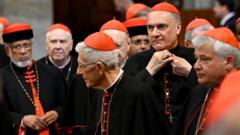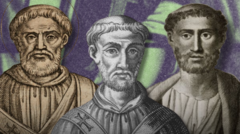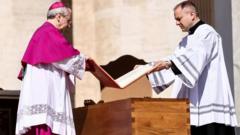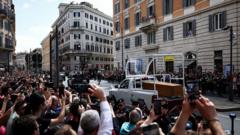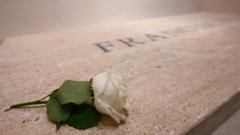As the Catholic Church globally contemplates its future leadership, the prospect of an African pope becomes more prominent amidst calls for greater representation and inclusivity.
Will Africa Finally Get an African Pope?

Will Africa Finally Get an African Pope?
The potential for the next pope to emerge from Africa increases as the continent sees rapid growth in its Catholic population.
If the cardinal-electors deliberating at the Vatican take into account the growth of Catholicism on the African continent, the outcome may shift in favor of an African successor to Pope Francis. Current statistics reveal that over half of global growth in Catholicism is attributed to Africa, with numbers reaching 281 million faithful, constituting 20% of the worldwide Church.
Historically, Africa has been underrepresented at the highest decision-making levels of the Church, further fueling discussions advocating for African leadership. Only three popes have hailed from Africa, the last being Pope Gelasius I over 1,500 years ago. Voices supporting an African pope contend that such a choice would resonate with the contemporary global Church, which increasingly reflects the continent's demographic changes.
While Father Stan Chu Ilo, a Nigerian priest and academic, asserts that having an African pope would symbolize the Church's diversity, he acknowledges the significance of choosing a candidate with a strong global profile. Prominent figures like Cardinal Robert Sarah of Guinea and Cardinal Fridolin Ambongo Besungu of the Democratic Republic of the Congo have gained recognition, alongside Cardinal Peter Turkson of Ghana, who remains a leading contender.
The transformative pontificate of Pope Francis, known for his outreach and humanitarian stance, has arguably paved the way for enhanced representation of African cardinals, increasing their ranks from 8% in 2013 to 12% in 2023, according to the Pew Research Center.
However, the conversation around leadership must transcend mere representation. Some African theologians caution against viewing an African pope as a panacea for the continent's church-related issues. Professor Paulinus Ikechukwu Odozor emphasizes the necessary theological acumen required for the papacy, insisting that effective leadership demands comprehensive knowledge of Church traditions, irrespective of geographical origin.
Pope Francis' tenure has also highlighted the complexities of addressing the diverse issues African Catholics face, including socio-economic challenges and local cultural dynamics. His commitment to promoting the Church's outreach within impoverished contexts is well regarded. Nonetheless, the church's stance on issues such as LGBTQ+ rights has encountered resistance among African bishops, who often maintain conservative views shaped by cultural and societal values.
As the conclave nears, the conversation reflects broader themes of inclusion, representation, and the balance of tradition with contemporary challenges. The specter of potential racism within the Church ranks further complicates the landscape; some scholars suggest this could impact perceptions of an African pope, regardless of the candidate's qualifications.
Despite the uncertainties surrounding the next papal election, many observers hope for a leader who embodies the compassion and "poor-first" philosophy that Pope Francis championed. The appointment of a new pope represents an opportunity for healing and revitalization within the global Catholic Church, potentially ushering in an era of leadership that is truly reflective of its diverse and growing community.


